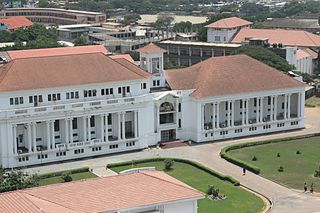Related Research Articles

The University of Ghana is a public university located in Accra, Ghana. It is the oldest public university in Ghana.
Wesley College of Education is a teacher education college in Kumasi, Ashanti Region in Ghana. It was initially established for the training of teachers, catechists and ministers. It was founded by the Methodist Church, located between New Tafo and Old Tafo towns. The beginning of Wesley College of Education goes back to 1918. Following the signing of the lease, the college was named, and the foundation stone of the present site was laid in 1922.

Prempeh College is a public secondary boarding school for boys located in Kumasi, the capital city of the Ashanti Region, Ghana. The school was founded in 1949 by the Asanteman traditional authority, the British Colonial Government, the Methodist Church Ghana and the Presbyterian Church of Ghana. The school is named after the King of Ashanti (Asantehene), Sir Osei Tutu Agyeman Prempeh II, who donated the land on which the school was built, and was modeled on Eton College in England.

The Supreme Court of Ghana is the highest judicial body in Ghana. Ghana's 1992 constitution guarantees the independence and separation of the Judiciary from the Legislative and the Executive arms of government.
George Kingsley Acquah was the twenty-third Chief Justice of the Supreme Court of Ghana(the eleventh since independence). He was appointed as Chief Justice on 4 July 2003 and was the incumbent until his death.

Samuel Azu Crabbe was a Ghanaian barrister, solicitor and jurist. He was the fifth Chief Justice of Ghana since it became an independent nation.
Edmund Alexander Lanquaye Bannerman was the Chief Justice of Ghana between 1970 and 1972. He was the fourth person to hold this position since Ghana became an independent nation in 1957. He was removed from office by the National Redemption Council, the military government in power after the coup of 13 January 1972 that ended the Second Republic of Ghana.

Offinso, is a town in the Offinso Municipality in the Ashanti Region of Ghana. The town is about fifteen minutes drive from Kumasi, the capital of the Ashanti Region; due to Offinso's proximity to Kumasi, many of the Offinso natives have relocated to Kumasi.
Joachim Amartey Quaye was a Ghanaian politician. He was found guilty of involvement in the murder of four Ghanaian citizens and executed by a firing squad in 1982.
Frederick Victor Bruce-Lyle was a Ghanaian-born jurist who was a judge in several Caribbean countries.
Kwabena Agyei Agyapong is Ghanaian civil engineer and politician.

Kwadwo Owusu Afriyie was a Ghanaian lawyer and politician. He held several political positions including serving as general secretary of the New Patriotic Party. He was serving as the chief executive officer of Forestry Commission of Ghana before his demise.
Cecilia Koranteng-Addow was a High Court judge in Ghana from 1975 until her abduction and murder on 30 June 1982, during the second military rule of Jerry Rawlings.
Isaac K. Amuah (1929-1997) was a Ghanaian judge. He was a justice of the Supreme Court of Ghana from 30 November 1995 to 19 August 1997.
James Ben Kaba was a Ghanaian politician and member of the first parliament of the second republic of Ghana representing Bolgatanga constituency under the membership of the Progress Party (PP).
Fred Poku Sarkodee was a Ghanaian judge and one of the three judges abducted and murdered on 30 June 1982.
Nana Kwabena Wiafe also known as Nana Kwabena Wiafe Ababio or, in private life, Kwabena Sanwo Ansah, was a traditional ruler and Omanhene of Offinso Traditional Area. He is known to be the first Offinso royal to be enstooled twice in Offinso history. He reigned from 1935 to 1945 and from 1959 to 1966.
On 30 June 1982 three high court judges and a retired army officer were abducted from their homes between the hours of 9:00pm and 10:30pm GMT and murdered at the Bundase military shooting range near Accra. The murders led to public outcry and the formation of a Special Investigations Board (SIB) to investigate the events. The report of the SIB led to the charging and trial of the perpetrators who were subsequently sentenced to death by firing squad. June 30 is commemorated every year as Martyrs Day in Ghana.
References
- ↑ "k a agyapong - Google Search". www.google.com. Retrieved 2022-08-06.
- ↑ Quantson, Kofi Bentum (2003). Ghana, National Security: --the Dilemma. Napasvil Ventures. ISBN 978-9988-8142-0-5.
- 1 2 3 4 5 6 7 8 9 10 11 Martyrs Day: Biography of late Justice Kwadwo Agyei Agyepong , retrieved 2022-08-06
- 1 2 3 4 5 6 "Lest We Forget = So That We Don't Forget". DailyGuide Network. 2019-07-04. Retrieved 2022-08-06.
- ↑ Review of Ghana Law. General Legal Council. 1982.
- ↑ Persons), Ghana Special Investigation Board (Kidnapping and Killing of Specified (1983). Final Report of the Special Investigation Board (Kidnapping and Killing of Specified Persons). Ghana Publishing Corporation.
- 1 2 "Judge murders: Kwabena Agyapong recounts how his father was abducted". GhanaWeb. 2018-10-04. Retrieved 2022-08-06.
- ↑ Yidana, Jacob Jabuni (2002). Who Killed the Judges?. Bismi Enterprise. ISBN 978-9988-0-0900-7.